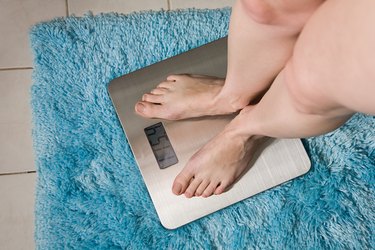
If you've decided that you're ready to lose weight, you probably want to lose it fast. While it's possible to lose 4 pounds in a week, you should only do so under the guidance of your doctor. Fast weight loss on a fad diet may get you the results you want, but it won't do much good at helping you keep off the weight. Consult your doctor before starting any weight loss diet.
Who Needs to Lose Weight Fast
Video of the Day
In most cases, it's not a good idea to lose weight too quickly. According to FamilyDoctor.org, weight loss greater than 2 pounds a week is not fat loss, but water and muscle. However, the only exception is in the case of people with obesity, and then only when it's recommended by your doctor. Obesity is defined as a body mass index greater than 30. For example, a 5-foot, 4-inch person weighing 200 pounds has a BMI of 34 and might be an appropriate candidate for a diet that promotes a 4-pound-a-week weight loss.
Video of the Day
How to Lose 4 Pounds in a Week Safely
A very low-calorie diet restricts caloric intake to 800 or fewer calories a day and can help produce a 3- to 5-pound weekly weight loss, according to the National Institute of Diabetes and Digestive and Kidney Diseases. Because of the severe caloric restriction, these diets typically consist of meal replacement products such as shakes that you consume in place of most or all of your meals. These types of products are high in protein and fortified with vitamins and minerals to help ensure your body gets what it needs without the calories. A very low-calorie diet should only be followed for a short-period of time, says the NIDDK, no longer than 3 months, and only under close supervision from a doctor.
For a person with obesity, losing weight so quickly may rapidly improve various health conditions, such as diabetes, blood pressure and cholesterol, according to NIDDK, making it beneficial for overall well-being. Losing weight quickly can also be motivating and help you stick to the diet.
The Downside of Fast Weight Loss
While losing weight quickly on a very low-calorie diet can be rewarding, it has downsides; some of the weight you lose may not be fat, but muscle. Losing muscle decreases your metabolism, which may make it harder for you to maintain the weight loss. Additionally, you may have a hard time keeping the weight off once you go back to eating regular food. It's very important that your very low-calorie weight loss plan offer a transitional diet, as well as a maintenance diet to teach you how to eat regular food, along with ongoing support to help you keep off the weight.
Potential side effects of rapid weight loss include fatigue and gastrointestinal distress such as constipation, diarrhea or nausea. Gallstones can also occur from the rapid weight loss, especially in women.
Benefits of Slow and Steady
Losing weight at a slower pace following a less restrictive diet may give you the time you need to create new healthy habits that help you keep the weight off for good. Instead of a very low-calorie diet, you can lose weight restricting your caloric intake to 1,200 calories to 1,600 calories a day eating real food, or a combination of real food and meal replacement products.
A person following a very low-calorie diet may not have the energy to exercise. But if you lose weight at a slower rate, you can add physical activity, which not only helps you burn calories but may also build muscle so you don't experience the decrease in metabolism. Ideally, you should be working out at a moderate intensity a total of 150 minutes a week, plus strength training twice a week.
- National Institute of Diabetes and Digestive and Kidney Diseases: Very Low-Calorie Diets
- FamilyDoctor.org: What It Takes to Lose Weight
- Harvard School of Public Health: Obesity Definitions
- Medifast: Banana Shake
- McKinley Health Center: Breaking Down Your Metabolism
- National Heart, Lung and Blood Institute: How Are Overweight and Obesity Treated?
- Centers for Disease Control and Prevention: How Much Physical Activity Do Adults Need?